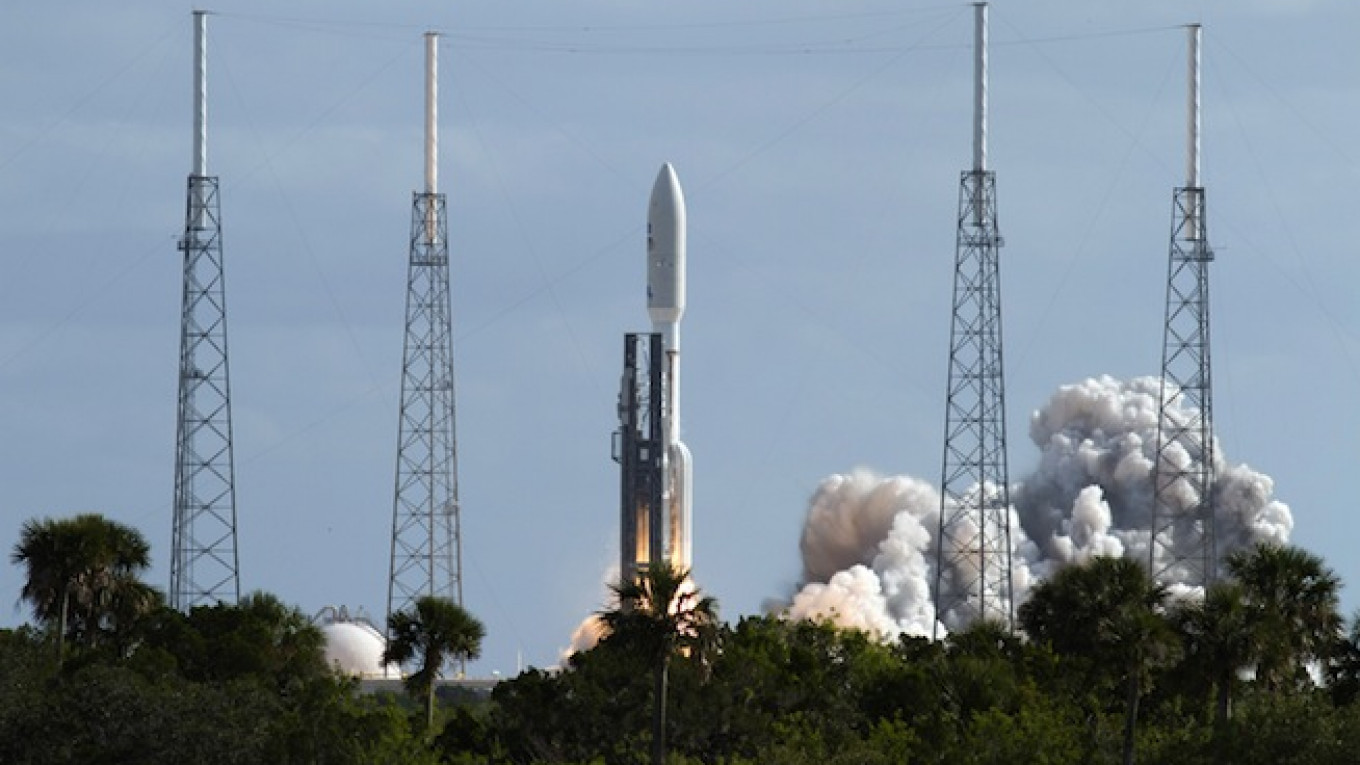A U.S. judge on Tuesday declined to expand on her order last week that barred a partnership owned by defense contractors Lockheed Martin and Boeing from buying Russian-made rocket engines used to launch U.S. military satellites.
The original injunction, issued Wednesday, stemmed from a lawsuit by rival Space Exploration Technologies, or SpaceX, in protest of the U.S. Air Force's award of a multibillion-dollar, non-compete contract for 36 core rocket boosters to Lockheed and Boeing's United Launch Alliance partnership.
United Launch Alliance uses Russian-made RD-180 engines for one of its two launch vehicles, a business arrangement that may be in violation of U.S. economic sanctions to punish Russia from invading Ukraine's Crimea peninsula.
The ruling by Federal Claims Court Judge Susan Braden temporarily prohibits the U.S. Air Force and United Launch Alliance "from making any purchases from or payment of money to NPO Energomash," the preliminary injunction states.
NPO Energomash is a Russian state-owned company that manufactures the RD-180 engine. The ruling also banned sales to any entities associated with Deputy Prime Minister Dmitry Rogozin, who is among the individuals subject to U.S. sanctions in protest of Russia's annexation of Ukraine's Crimea peninsula.
The injunction, however, does not impact purchases made before the Apr. 30 ruling, Braden's law clerk Chris McCall wrote in an email on Friday to the Justice Department, which had asked for a clarification of the order.
Both United Launch Services, a holding company of United Launch Alliance, and privately owned SpaceX, filed responses to the Justice Department's request that Braden clarify her order.
"There is no need whatsoever to broaden the scope of the injunction. Doing so would needlessly bring all payments under ULS's contract to a halt, damaging a key national security program and inflicting irreparable harm both on ULS and a universe of U.S. suppliers and businesses that support it," ULS attorney Jason Carey wrote on Monday.
On Tuesday, Braden declined the request for clarification, clearing the government to continue doing business with United Launch Alliance.
ULS said it has enough RD-180 engines previously ordered or in stock to meet the military's launch needs for two years and is looking into possible domestic production.
An Air Force review of RD-180 engine issues was scheduled to be completed last week.
SpaceX, which is owned and run by technology entrepreneur Elon Musk, founder and chief executive of sister car company Telsa, wants to compete for the military's launch business. The firm's upgraded Falcon 9 rocket is in the midst of being certified to fly the Pentagon's most critical and expensive satellites. In December, however, the U.S. Air Force signed an exclusive agreement with United Launch Alliance for 36 rocket cores over five years, shutting out potential rival bids by SpaceX and other contenders.
Hawthorne, Calif.-based SpaceX sued in the U.S. Court of Federal Claims on Apr. 28. It did not specifically seek a ban on United Launch Alliance and Air Force purchases of RD-180 rocket engines, though Musk has suggested that Rogozin financially benefits from the business.
The Department of Justice is working to obtain letters showing that the purchase of RD-180 rocket engines does not fall under the U.S. government sanctions against Russia, Rye said.
See also:
U.S. Court Issues Injunction Prohibiting Russian Rocket Engine Purchases
A Message from The Moscow Times:
Dear readers,
We are facing unprecedented challenges. Russia's Prosecutor General's Office has designated The Moscow Times as an "undesirable" organization, criminalizing our work and putting our staff at risk of prosecution. This follows our earlier unjust labeling as a "foreign agent."
These actions are direct attempts to silence independent journalism in Russia. The authorities claim our work "discredits the decisions of the Russian leadership." We see things differently: we strive to provide accurate, unbiased reporting on Russia.
We, the journalists of The Moscow Times, refuse to be silenced. But to continue our work, we need your help.
Your support, no matter how small, makes a world of difference. If you can, please support us monthly starting from just $2. It's quick to set up, and every contribution makes a significant impact.
By supporting The Moscow Times, you're defending open, independent journalism in the face of repression. Thank you for standing with us.
Remind me later.






